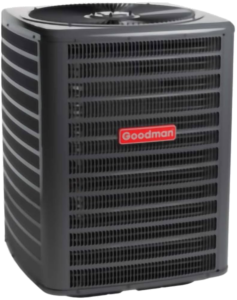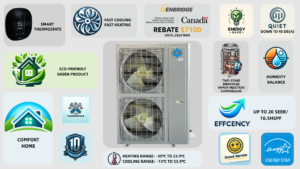Heat pumps and traditional air conditioners are both systems used for cooling indoor spaces, but they operate in slightly different ways and serve additional functions. Here’s a brief comparison
between the two:
Traditional Air Conditioners:

- Cooling Only: Traditional air conditioners are designed solely for cooling purpo
ses. They extract heat from indoor air and release it outside, leaving the inside air cooler.
-
Operation: Traditional AC units use a refrigerant to absorb and transfer heat. The refrigerant circulates between the indoor and outdoor units, absorbing heat indoors and releasing it outdoors.
- Seasonal Use: Typically, air conditioners are used during warmer months to maintain comfortable indoor temperatures.
- Heat Source: Traditional AC units do not provide heating. In colder climates, a separate heating system, such as a furnace, is required.
Heat Pumps:

- Cooling and Heating:Heat pumps are versatile systems that can provideboth cooling and heating.
They operate by reversing the refrigeration cycle, allowing them to absorb heat from the outside air (even in cold weather) and release it inside for heating purposes. - Year-Round Use: Heat pumps are suitable for year-round use, providing efficient heating during winter and cooling during summer.
- Efficiency: Heat pumps are known for their energy efficiency because they move heat rather than generate it. This makes them especially cost-effective in moderate climates.
- Environmental Impact: Heat pumps often have a lower environmental impact compared to traditional AC units because they use electricity to move heat rather than burning fuel to create it.
- Initial Cost: While heat pumps may have a higher upfront cost compared to traditional AC units, the ability to provide both heating and cooling functions can result in overall cost savings.
Considerations:
- Climate: Heat pumps are generally more efficient in milder climates. In extremely cold climates, supplemental heating may be needed.
- Cost: Consider the initial cost, long-term energy savings, and potential utility incentives when choosing between a heat pump and a traditional AC unit.
- Versatility: If you value a year-round solution for both heating and cooling, a heat pump might be a more suitable choice.
Ultimately, the choice between a heat pump and a traditional AC unit depends on your specific needs, the climate of your location, and your preferences for energy efficiency and versatility.
| Aspect | Heat Pump | Traditional Central A/C |
| Energy Efficiency | √ | × |
| Floor Area | Small Footprint | Large Footprint |
| Energy Saving Index | √ | × |
| Heating & Cooling Capability | √ | Cooling Only |
| Cost Effectiveness | Higher initial cost, but more savings over time (rebate available) | Lower initial cost, but higher operating costs |
